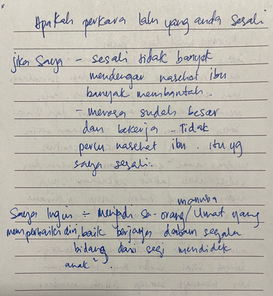Writer-in-residence, Kembali: Dia Hakim Khaeri
Engagement date: 21 July 2022
Religion has always existed in a complicated realm when it comes to art. Certain traditional communities – such as the Malay-Muslim community – are known for being more resistant to artistic modes of expression. If it’s not used as a form of dak’wah (propagation, or spreading the message), art is also closely associated with a form of “western” liberation, foreign forms of sin permeating into everyday life.
The session begins with Hasyimah introducing a song – Demi Masa by Raihan. She explains her relationship with the song – how her father would play songs like these amongst other things like The Spice Girls, usually on road trips up to places like Kuala Lumpur. Her younger self didn’t understand the meaning behind the seemingly simple song, but now that she’s grown, she feels the song communicates Islam more effectively to her. And to some extent (in my perspective, because I’ve learned way too much of the religion for close to 10 years – and still continue to) it is more succinct. To base off the Ibnu Abbas hadith, and boil down the essence of Islam to five main principles.
She then introduces the theme of the session with two questions:
Question 1: Apakah perkara lalu yang anda sesali?
(What are some things in your past that you regret?)
Written reflection by elders
Question 2 Apakah perkara yang ingin anda ubah dalam hidup?
(What are some things that you would change in your life?)
Written reflection by elders
The atmosphere changes when the questions are posed. The participants show varying levels of comfort. Some remain on their phone, whether that’s necessary or not. Some are comfortable sharing, their expressions hidden behind their masks. Some are free to give their answers on their own accord. Some lean towards Hasyimah, whispering their inner selves into her ears.
One thing that is for sure though, is the support these women give each other. They don’t say too much when a participant offers their answers, but they nod. They make prayers for each other, they acknowledge each other. The very act of lending themselves to another, just listening. One might easily gloss over how that in itself can be a revolutionary act – both in general society, or in one’s day to day life. It reminded me of how we are truly not made to endure alone.

The answers from the participants however follow a similar recurring theme. In regards to question one, most of these women talk about how they wish they had listened to their parents / elders more. They feel they’ve sinned a lot when they were younger, and carry that guilt with them. This carries itself into the second question. They want to change their relationships with their existing families. They wish, to some extent, to be loved differently.
I walked into this project right in the middle, so I feel it’s a bit of a slightly angled perspective when I look at it right now. I am an observer that sees the project on the cusp of its completion.
The funny thing about art is that a simple thing – whether a movement of the body, an ad-lib, a brushstroke, a glass of water on a canvas on the floor. A moment. A second. All of those can be captured, and added up.
What seems to the surface – a meaningless conversation, a small moment of vulnerability – adds to the value of the choreography. Even through the mistakes, they are getting the hang of it. They remind each other of what to do, the subtle-not-so-subtle moments of pulling a person back, gently placing their hand on the right place. They are tethering close to a fully formed product. Which is too impressive in itself.
Somehow, after their vulnerabilities are out to the open, to the performing space they share every week. There is an air to their movements that has changed. To create is to bring parts of yourself where you wouldn’t have imagined yourself sharing. I think that is where the work is at.
When we engage communities, we also bring these vulnerabilities into the work. These seniors carry their own beliefs of maruah and aurat – into a work that displays their bodies on a very public scale, along with their fears and emotions. Perhaps the question of “kembali” will constantly come to mind when we inevitably see them onstage at Heartbeat. At any stage of their performance, they return to something they once were. Or if just by dancing, they return to a place that no belief, religion or form will ever restrict them by.
Either way, the realm of art, in spite of its perceptions: welcomes all. No matter who you are, where you come from, or what you believe in.





















Sellers can also benefit indirectly from real estate rebates. Buyers with extra funds from rebates may be more willing to increase their offer price, leading to a smoother negotiation process. Additionally, sellers who work with rebate-friendly agents may attract more buyers, increasing the likelihood of a quick sale. Understanding the broader impact realtor credit to buyer of rebates helps all parties make informed decisions in a real estate transaction.
Award-winning Chicago live music entertainment for weddings, corporate events, and fundraisers.
Wedding band song list
I’ve been using this storage facility for months, and it’s been a great experience. big storage units The environment is secure, the facility is spotless, and the team is helpful and professional at all times.
The integration service is fast and reliable. It connects multiple sales channels effortlessly, ensures quick transactions, and offers robust security. Their team’s commitment to excellence qb software and customer support is impressive.
Professional, friendly, and hardworking – the crew made decluttering a smooth process. redmond junk removal They removed everything efficiently and left my home spotless. A service I wholeheartedly recommend.